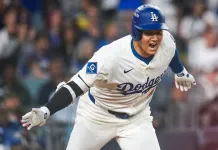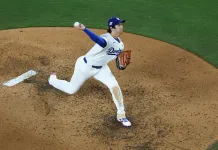Two-out hitting is what often decides an MLB Playoff game. The Phillies went 1-for-19 in Games 1 and 2 and then went 6-for-13 in Game 3. They won the game 4-2, overcoming some defensive miscues once again, but holding the Padres offense at bay. There’s a reason why I call the playoffs the Tournament of Variance and this is one grand example of why. Not only do we not have the NL’s two best teams vying for a chance at the World Series, but timely hits in high-leverage spots decide games.
That’s especially true when the gaps between the teams are so much lower than in the regular season. Every little thing gets magnified in the playoffs. A ball called a strike that changes the count. A check swing appeal. Managerial decisions. So much of the game’s little moments carry more weight. Truth be told, it makes for a very hard handicapping environment, as I’ve been reminded about over the last several days.
The Phillies have kicked the ball around in this series (and throughout the season), but came together for a huge 4-6-3 double play with the game hanging in the balance in the sixth. Then they scored an insurance run in the sixth when Bob Melvin made a mistake letting Joe Musgrove turn the lineup over again and a ball that Juan Soto just missed with a dive. The playoffs, and betting them, are not for the faint of heart.
We’ve got both series today, so here are some thoughts on the two games.
Houston Astros at New York Yankees (-145, 7)
The Yankees would rather not be down 2-0 in the series, but they’ve got Gerrit Cole on the mound for this must-win game in the Bronx. Falling behind Houston 3-0 would effectively end the series, it would just be a question of how long it would take to be finished. There are no off days the rest of the way, which is a huge advantage to the Astros with a much deeper bullpen.
Cole has been great in these playoffs in two starts, holding the slap-hitting Guardians to three runs on 10 hits with 16 strikeouts against two walks. He did give up solo homers to Steven Kwan and Josh Naylor, but yielded little hard contact beyond that. The Guardians had the lowest K% in the regular season, but Cole still generated a ton of swings and misses and long, lonely walks back to the dugout. The Astros also don’t strike out, so we’ll see if Cole has similar success against a vastly superior lineup.
The long ball is what you worry about with Cole, as he allowed 33 in 33 starts, much to the chagrin of Yankee fans, who were way too hard on him on social media throughout the season given the rest of his strong numbers. He wound up with a 3.50 ERA, 3.31 xERA and 3.47 FIP, but his xFIP was 2.78, as he did allow a 16.8% HR/FB%.
We’ll have to wait and see if the Yankees caught a break with Cristian Javier on the mound. Lance McCullers Jr. banged his elbow celebrating the win over the Mariners, so he’s been pushed back to Game 4 against Nestor Cortes tomorrow. Javier was brilliant during the regular season with a 2.54 ERA, 2.43 xERA and 3.16 FIP over 148.2 innings of work. This will be the 25-year-old’s first playoff start and it comes in an extremely hostile environment.
He’s also only thrown 1.1 innings since his final regular season start on October 1. It is not easy to stay sharp, particularly to stay sharp for this type of atmosphere. Javier is about as big of a contrast as you can get from Framber Valdez. Valdez is an extreme ground ball guy and Javier is about as extreme as a fly ball guy can be, posting just a 26% GB% for the season. He allowed 17 homers in 25 starts and five relief outings.
The question here basically amounts to how many home runs the Yankees can hit. Javier has only allowed 192 hits over 304.1 career innings and only allowed 89 hits over the 148.2 innings he pitched this season. Fly balls sometimes lead to home runs, but Javier struck out 194 and pitches to an extreme launch angle that leads to a lot of pop ups, which are effectively strikeouts as well.
I honestly don’t know what to think about this matchup. My default is to take the Astros because they’re almost never this big of a favorite and their lineup is good enough to hit any pitcher. I’m also not sure how sharp Javier will be or how far he is expected to pitch with Luis Garcia likely the man waiting in the wings if the Astros need bulk innings.
I think this play is Astros or nothing, with nothing being my preferred choice.
No bet
San Diego Padres at Philadelphia Phillies (-115, 8)
With the 2-3-2 format, the Phillies have the chance to avoid the five-hour, 40-minute flight to San Diego if they can win tonight and tomorrow. It will be Bailey Falter for Philadelphia and Mike Clevinger for the Padres in the biggest starts of their respective careers. Falter has not pitched in the postseason, so it has been 17 days since he saw live game action and he only pitched one inning in that October 5 game.
Clevinger did pitch in the NLDS against the Dodgers and it did not go well. He allowed four earned runs (five total) on six hits with three strikeouts and two walks across the 16 batters that he faced. He only recorded eight outs and never looked sharp at any point. For a guy that finished the regular season with a 4.33 ERA, a 4.65 xERA and a 4.98 FIP, that was a hardly surprising outcome. He was also sick for the NL Wild Card Round and injured multiple times during the regular season.
The Dodgers are a bad matchup for anybody, but Clevinger was rocked in three regular season starts against them. It’s entirely possible that he fares a bit better against the Phillies here, but keeping the ball in the park and ending innings seems easier said than done right now against this Philadelphia lineup.
Through three games, I’ve realized that I don’t have a good handle on this series. That will happen when you get two teams like this playing in these ultra-important games. There’s a reason why the Padres and Phillies were the only teams in the NL to win under 90 games. There’s a reason why the Phillies didn’t clinch a playoff spot until right before the end of the regular season. Over 162 games, the deepest and most consistent teams end up the best. In these small playoff samples, a lot of volatility is present and we’ve seen that play out, at least in the NL. So, these are two teams that are less consistent, not as deep and also harder to gauge and read on a daily basis.
The Padres were 0-for-7 on batted balls of 95 %plussign% mph against Suarez yesterday. The Phillies were 6-for-6 on theirs with a homer, three doubles and two singles. That’s the game in a nutshell and it feels like I just can’t get a handle on the series.
One obvious point to make for Game 4 is that Seranthony Dominguez threw 34 pitches over his two innings, so you worry about his effectiveness today. Zach Eflin and Jose Alvarado both allowed two hits in their appearances. The Phillies bullpen has flirted with danger, which makes this start for Falter that much more interesting. He had a 3.86 ERA with a 4.65 FIP during the regular season, as he allowed 16 home runs in just 84 innings. Like Suarez, he’s more of a pitch-to-contact guy, but he pitches to fly ball contact.
Falter struck out 74 in 84 innings and only issued 17 walks, so he’s around the plate a lot. That means this game is subject to batted ball variance on both sides. Clevinger is usually more of a strikeout guy, but he only had 91 in his 114.1 innings. He, too, had a home run issue with 20 of those allowed. Alas, the sportsbooks aren’t dumb and they’ve made this total 8.
I don’t have a play here, but this will be a massive game for the fate of the series. If the Phillies win, the Padres will have to win three straight, including games against Zack Wheeler and Aaron Nola. With that Padres series price in pocket, I’m hoping for the best, but it does look like I underestimated the Phillies in this series.
No bet





